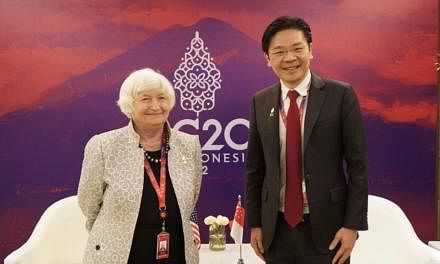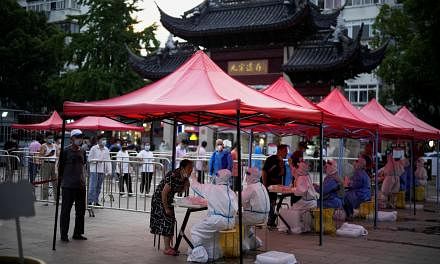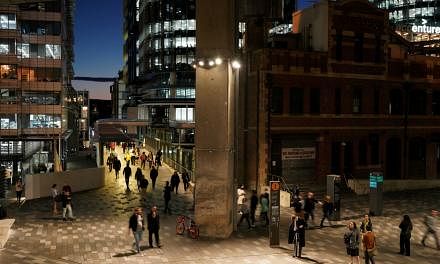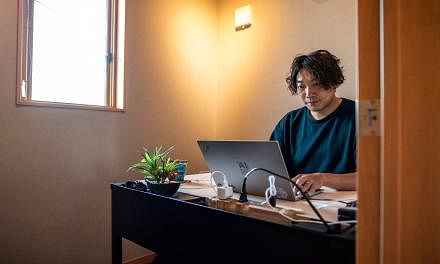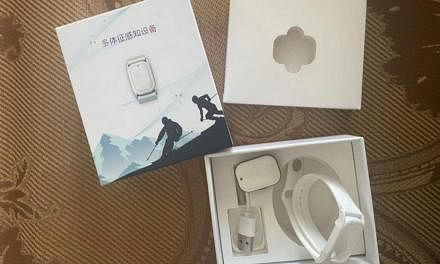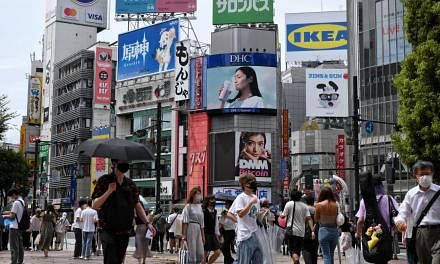TOKYO (NYTIMES) - To understand how Japan has fared better than most of the world in containing the dire consequences of the coronavirus pandemic, consider Ms Mika Yanagihara, who went shopping for flowers this past week in central Tokyo. Even when walking outside in temperatures in the mid-90s, she kept the lower half of her face fully covered.
"People will stare at you," Ms Yanagihara, 33, said, explaining why she did not dare take off her mask. "There is that pressure."
Japan's Covid-19 death rate, just one-twelfth of that in the United States, is the lowest among the world's wealthiest nations. With the world's third-largest economy and 11th-largest populace, Japan also tops global rankings in vaccination and has consistently had one of the globe's lowest infection rates.
Although no government authority has ever mandated masks or vaccinations or instituted lockdowns or mass surveillance, Japan's residents have largely evaded the worst ravages of the virus. Instead, in many ways, Japan let peer pressure do a lot of the work.
Even now, as average daily cases have fallen to just 12 per 100,000 residents - about one-third of the US average - a government survey in May found that close to 80 per cent of people working in offices or enrolled in school wear masks and about 90 per cent do so when using public transit.
Movie theatres, sports stadiums and shopping malls continue to request that visitors wear masks, and for the most part, people comply. The term "face pants" has become a buzzword, implying that dropping a mask would be as embarrassing as taking off one's underwear in public.
Many factors have undoubtedly contributed to Japan's coronavirus outcomes, including a nationalised health care system and severe border controls that have outlasted those in many other countries.
But social conformity - and a fear of public shaming that is instilled from the youngest ages - has been a key ingredient in Japan's relative success in Covid-19 prevention, experts say.
Unlike in many other countries, Japanese law does not permit the government to order lockdowns or vaccinations. The majority of the population followed one another in heeding guidance from scientific experts who encouraged people to wear masks and avoid situations where they would be in enclosed, unventilated areas with large crowds.
After a slow start, once Japan ramped up the distribution of vaccines, most people followed advisories to get them. Even without mandates, close to 90 per cent of all people older than 65, the most vulnerable population, have received booster shots, compared with 70 per cent of US seniors.
In Japan, "if you tell people to look right, they will all look right," said Dr Kazunari Onishi, an associate professor of public health at St Luke's International University in Tokyo.
"Generally, I think that being influenced by others and not thinking for yourself is a bad thing," Dr Onishi added. But during the pandemic, he said, "it was a good thing."

Unlike in the United States, wearing a mask or getting a vaccine never became ideological litmus tests. Although trust in government has fallen during the pandemic, in a country where the same party has governed for all but four years since 1955, the public put pragmatism over politics in the approach to Covid-19.
Often, people policed one another or businesses seen to be violating municipal requests to close early or stop serving alcohol during periods designated as states of emergency.
"We got so many reports about shops being open that we started joking about the 'self-restraint police,'" said Ms Yuko Hirai, who works in the emergency response department in Osaka, Japan's third-largest prefecture. "People were definitely aware that society's eyes were on them." The practice of keeping in line with peers is inculcated in schoolchildren, who wear uniforms in most public schools and are shamed into following institutional expectations.
"Just being removed from the group is such a big deal for Japanese kids," said Dr Naomi Aoki, associate professor of public management at the University of Tokyo. "They always want to belong to a social group and don't want to feel isolated."
Children are taught to act for the collective benefit. Students clean classroom floors and school grounds and take turns serving lunch in cafeterias.
Japanese culture also depends on an ethic of public self-restraint that can be marshalled into group action. When Emperor Hirohito was dying in 1988, pop singers postponed weddings and schools cancelled festivals.
After the 2011 nuclear disaster in Fukushima led to serious power shortages, the public cut back on electricity use voluntarily. With temperatures rising in Tokyo this past week, residents are being asked to do so again.
During the pandemic, politicians tapped "into this collective idea of self-restraint for the public good," said Dr James Wright, an anthropologist at the Alan Turing Institute in London who has studied Japan's coronavirus response.
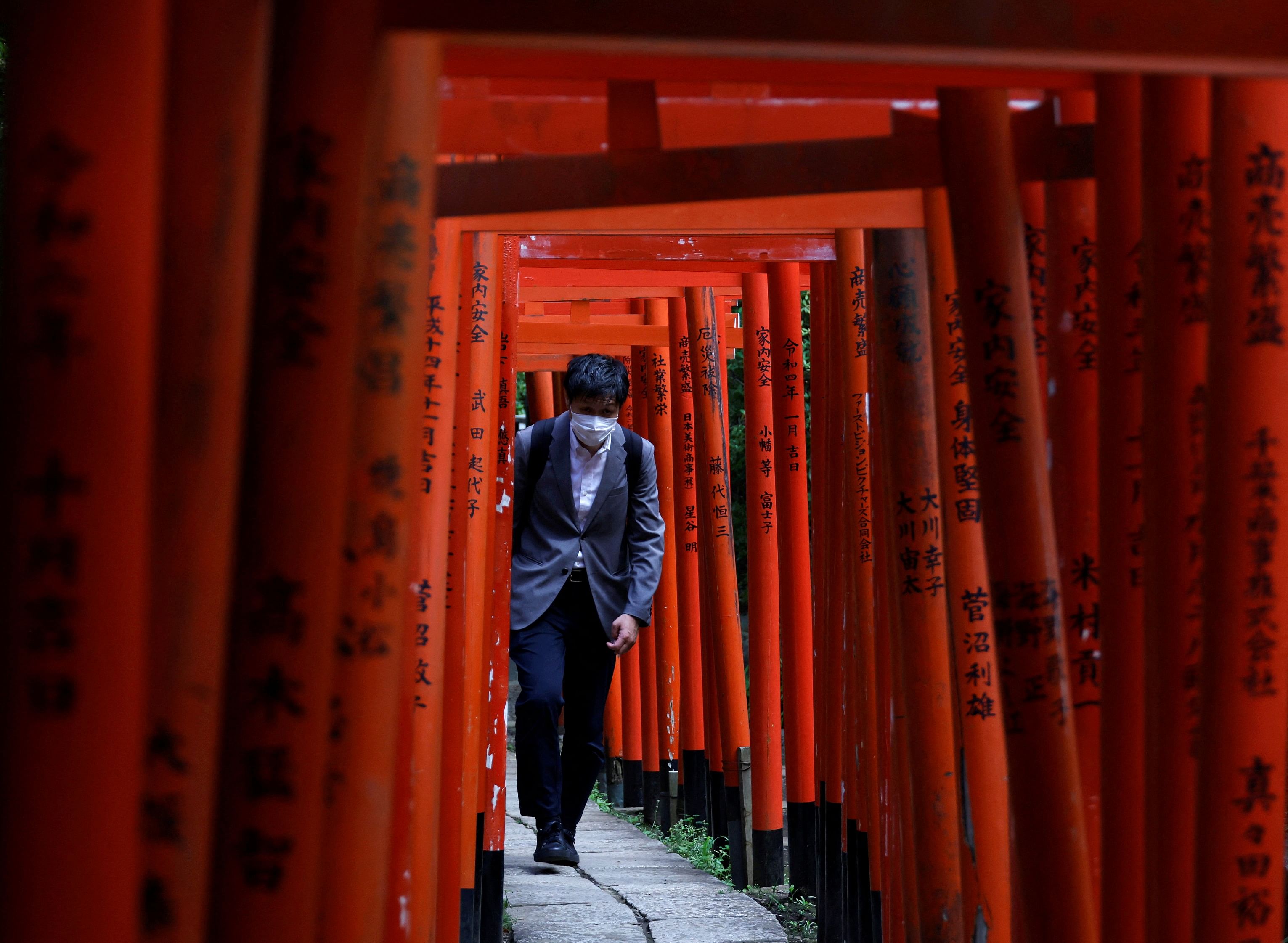
When the coronavirus emerged from China in early 2020, Japan was among the first countries where it showed up, spreading in small clusters and aboard the Diamond Princess, a cruise ship that docked in Yokohama and suffered a large outbreak. Japanese experts quickly realised that the virus was airborne and that the best way to reduce its spread was to keep people from gathering in small, unventilated spaces or having close contact with others.
With few legal options for enforcing the guidance, authorities hoped the population would voluntarily comply with pleas to stay home, said Dr Hitoshi Oshitani, a professor of virology at Tohoku University in northeastern Japan and a government adviser.
Despite Japan's culture of collectivism, Dr Oshitani was surprised when businesses quickly closed and people refrained from going out. Companies that had never allowed telecommuting sent employees home with laptops. Families cancelled visits to older relatives. Close to 200 industry groups representing theatres, professional sports teams, and venues that hosted weddings and funerals issued lengthy protocols for preventing infections.
The public embraced the guidelines, and the overall death rate actually fell below that of the year immediately preceding the coronavirus outbreak.
Those who tried to buck the guidance were subjected to public condemnation. Mr Toshio Date, who operates a venue in Osaka devoted to the board games Go and shogi, initially tried to stay open when the city requested that restaurants, bars and other entertainment businesses shut down.
When local television stations started asking to film the club as an outlier, Mr Date, 58, got the message and quickly closed. Even after infections settled down in Osaka, which recorded the highest death rate in Japan, and businesses reopened, he said strangers frequently scolded him for hosting too many customers.

Although the public has provided most of the sticks, the government has offered carrots in the form of economic subsidies for businesses.
In 2020, the country paid out more than US$40.5 billion (S$56 billion) to more than 4.2 million small- to medium-size companies and individual business owners, according to statistics from the Japanese Ministry of Economy, Trade and Industry.
Larger businesses received "cooperation money" based on their pre-pandemic revenue, as much as 200,000 yen (S$2,060) a day.
The incentives were not universally effective. In the first summer of the pandemic, clusters of infections began appearing in nightlife districts in central Tokyo, as visitors to bars and cabarets ignored the experts' advice.
When businesses flouted guidance on ventilation, masking and alcohol-sanitising, city officials were dispatched to convince them to fall in line. Only as a last resort were businesses fined or cut off from economic subsidies. In Tokyo, according to the city's Bureau of Industrial and Labor Affairs, between 96 per cent and 98 per cent of businesses ultimately agreed to follow the rules.
Experts warn that voluntary compliance is no guarantee of indefinite success.
"The response is like an Othello game," said Dr Oshitani, comparing Japan's coronavirus results to the board game where one move can change a winning outcome to a losing one. "All of a sudden, the most successful countries can become the worst country in the world," he said.
For now, residents continue to bow to peer pressure.
Ms Kae Kobe, 40, a receptionist at an office in Shibuya, said that because her job is client-facing, she always wears her mask at work.
"Everyone around is still wearing it," she said. "So it's hard to get rid of it."

